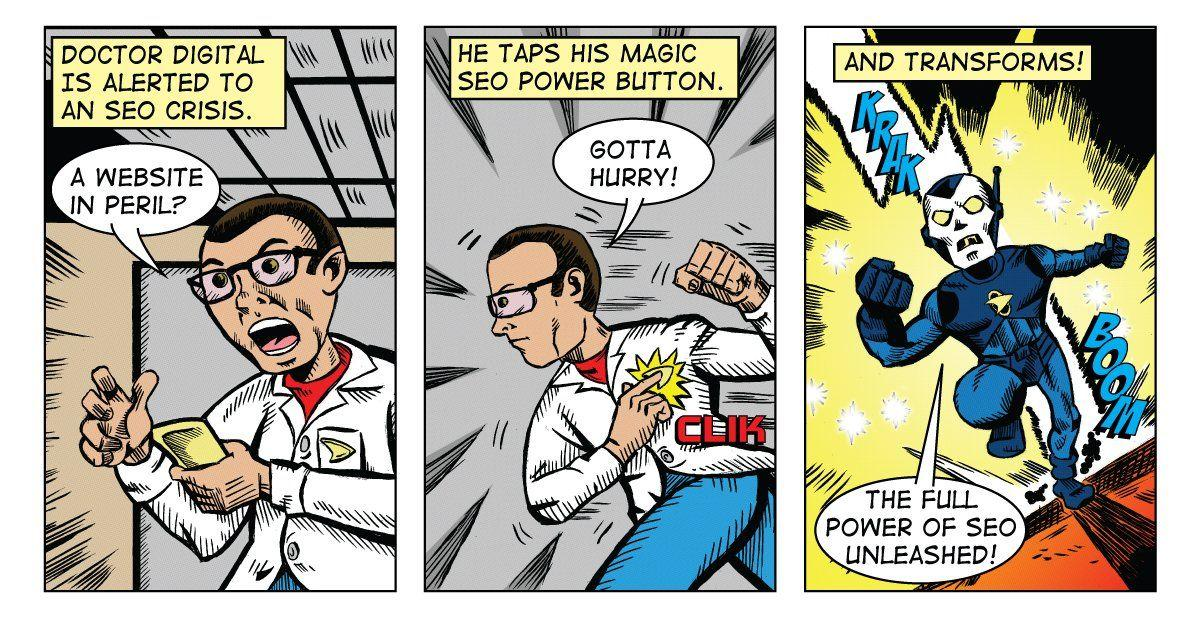The Importance of Digital Marketing in the Healthcare Industry
There’s a vital element that many professionals often overlook in the healthcare industry: online visibility.
It’s easy to get caught up in the day-to-day of providing top-notch care and forget that the digital arena is precisely where a significant chunk of your audience resides.
The truth is, in the modern digital age, the lack of a strong online presence is akin to keeping your practice’s brilliance under a bushel.
Why is online visibility so critical? First and foremost, it’s about reach. The internet is a bustling hub where potential patients start their healthcare journey.
Whether they’re looking for a new dentist, researching a particular symptom, or seeking the best local physiotherapist, their first instinct is to search online. If your practice isn’t visible in these searches, you’re missing out on a vast audience actively seeking the very services you offer.
But it’s not just a matter of being seen; it’s also about engagement. Online visibility allows you to connect with your audience in ways that go beyond traditional advertising. It’s an opportunity to educate, inform, and build trust even before a patient steps into your clinic.
This engagement plays a big role in converting casual web browsers into loyal patients.
This is where healthcare digital marketing, the very foundation that holds successful online visibility, enters the picture. This isn’t a one-size-fits-all solution; it’s a tailored approach that involves understanding your unique audience, their online behaviors, and the best ways to reach them.
It’s a multifaceted strategy that includes optimizing your website for search engines, engaging with patients on social media, managing online reviews, and much more.
If you’re hearing about digital marketing in healthcare for the first time, or you’ve heard about it before but haven’t really paid much attention to it, you’re at the right place.
In this blog, we’ll unpack the importance and benefits of digital marketing for healthcare professionals. By the end of this blog, you’ll have a comprehensive and clear understanding of why your practice needs digital marketing and the right way to kick-start the journey to a booming practice.
All aboard? Let’s begin!
1. What Exactly Does Healthcare Digital Marketing Include?

Healthcare digital marketing is a multifaceted approach that encompasses a range of strategies and tools designed to enhance the online presence of healthcare providers.
It entails creating and disseminating content across various digital platforms to engage potential and existing patients.
Let’s break down what this typically includes:
1.1. Search Engine Optimization (SEO)
At its very core, SEO involves optimizing your website and content to rank higher on search engine result pages (SERPs). This means using relevant keywords, optimizing website speed, and ensuring mobile-friendliness.
The goal is to easily get discovered by someone who’s looking for healthcare services in your area or seeking information on health-related topics. By turning to SEO for healthcare providers, you can give your practice a big boost among online spaces.
When considering SEO services for your healthcare practice, be selective and discerning in your choice. The landscape of SEO is vast and varied,with many providers promising quick fixes and top rankings. However, the real value lies in finding an SEO agency that understands the healthcare industry’s specific needs and nuances.
An ideal SEO partner should have a proven track record in the healthcare sector. They must demonstrate an understanding of patient behavior, healthcare terminologies, and the sensitive nature of medical content. They should also be committed to ethical SEO practices and must steer clear of any shortcuts or black-hat techniques that could harm your reputation or credibility in the long run.
Take your time, do your research, and find the right healthcare SEO partner.
1.2. Content Marketing

Content marketing, like SEO, also falls under the umbrella of digital marketing in healthcare. This strategy revolves around creating valuable, relevant, and consistent content to attract and retain a clearly defined audience.
In the healthcare sector, this could include blog posts about health tips, articles on medical advancements, patient success stories, or informational videos. Content marketing positions your practice as a knowledgeable and trustworthy source in the healthcare industry.
Let’s consider a few examples:
- Health Tips Blog Series: A family healthcare practice could run a weekly blog series offering practical health tips. The topics may range from nutritional advice to managing common ailments at home. For instance, a blog post titled “10 Tips for a Healthy Heart” or “Effective Ways to Manage Seasonal Allergies” would not only draw readers looking for health information but also showcase the practice’s expertise.
- Patient Success Stories: A specialized clinic, like an orthopedic center, could share patient success stories. These stories, possibly titled “John’s Journey: Overcoming Knee Injury with Our Advanced Physiotherapy” or “How Minimally Invasive Surgery Changed Sarah’s Life”, could help humanize the brand and demonstrate the real-world success of their treatments.
- Informative Videos: A dental clinic may create short videos explaining common dental procedures or offering oral hygiene tips. A video titled “Understanding Root Canal Treatment: What to Expect” can help demystify a commonly feared procedure, while “Daily Dental Care Routines for Healthy Teeth” can be a practical guide for patients.
- Interactive Health Quizzes: A healthcare provider could engage their audience with interactive content like health quizzes. For example, a quiz titled “Test Your Diabetes Awareness” or “Is It Time for a Health Check-Up?” is a great way to educate and encourage readers to think about their health and potentially seek services.
- Infographics on Medical Advancements: A hospital or medical center could create infographics on the latest advancements in medical technology or treatment methods. An infographic on “The Future of Robotic Surgery” or “Breakthroughs in Cancer Treatment” can position the hospital as a leader in medical innovation.
1.3. Social Media Marketing
Social media platforms like Facebook, X, LinkedIn, and Instagram offer healthcare providers a way to connect with patients on a more personal level.
This includes sharing health tips, news, and behind-the-scenes glimpses of your practice.
It’s a powerful tool for building community, increasing engagement, and even managing your practice’s reputation.
1.4. Email Marketing
Email campaigns allow healthcare providers to communicate directly with their audience. Whether it’s a newsletter, health reminders, or information about new services, email marketing keeps your patients informed and engaged with your practice.
One significant benefit of email marketing is the ability to segment your audience and tailor content to specific groups. For instance, you could send targeted emails about pediatric care to families with young children or provide information about senior health services to an older demographic. This customization ensures that your messages are relevant and valuable to each recipient.
Furthermore, email campaigns can be used to keep patients updated about changes in your practice, such as new healthcare providers joining your team, changes in office hours, or updates to policies and procedures. This kind of transparency builds trust and keeps your patients in the loop; it makes them feel more connected to your practice.
In terms of engagement, email marketing can encourage feedback and interaction. You could invite patients to participate in surveys, provide feedback on their experiences, or ask questions. This two-way communication fosters a sense of community and shows patients that their opinions and satisfaction matter to your practice.
Promotional content, while less frequent, can also be part of your email marketing strategy. Information about special promotions, new service offerings, or patient referral programs can be communicated effectively through email. However, it’s important to balance promotional content with informative and educational material to avoid overwhelming your patients with advertisements.
1.5. Pay-Per-Click (PPC) Advertising
PPC involves placing ads on search engines or social media platforms and paying each time someone clicks on them.
For healthcare professionals, this can be an effective way to reach potential patients who are actively searching for specific healthcare services or treatments.
One of the key strengths of PPC in healthcare marketing is its ability to be highly specific. For example, if your dental practice specializes in cosmetic dentistry, your PPC ads can be tailored to appear when someone searches for “cosmetic dental services” or “teeth whitening.” This level of specificity ensures that your ads are seen by individuals who are most likely to be interested in your services.
Another significant advantage of PPC is the speed at which it can impact your practice’s visibility. Unlike organic search strategies, which can take time to yield results, a well-crafted PPC campaign can propel your practice to the top of SERPs almost immediately. This immediacy can be particularly beneficial for new practices looking to establish a patient base or for established practices launching new services or promotions.
PPC also offers the flexibility of budget control. You can set the maximum amount you’re willing to spend per day or per click, making it easier to manage your marketing budget and measure the ROI of your campaigns. This flexibility ensures that practices of all sizes can leverage PPC advertising regardless of their marketing budget.
1.6. Online Reputation Management
This includes monitoring and responding to reviews on platforms like Google, Yelp, or health-specific review sites.
Positive reviews are invaluable in this digital landscape. They act as powerful testimonials of your services, expertise, and patient care quality. When potential patients read positive experiences from others, they feel more confident and comfortable visiting the well-reputed practice. Trust and credibility are established.
It’s essential, therefore, to encourage satisfied patients to share their experiences online. This can be done gently and ethically at the end of their visit or through follow-up emails.
Recommended Read: Online Reputation Management and SEO: Is There a Link?
1.7. Analytics and Reporting
Understanding the performance of your healthcare digital marketing efforts is imperative. This involves analyzing data from your website and social media platforms to see what’s working and where improvements can be made. This helps in making data-driven decisions to enhance your digital marketing strategies.
1.8. Mobile Marketing

In 2024, mobile marketing has become an indispensable component of digital marketing for healthcare providers, primarily due to the ubiquitous use of smartphones.
People are increasingly reliant on their mobile devices for accessing information, making decisions, and managing their daily lives (including their healthcare needs). Optimizing your digital marketing efforts for mobile users isn’t just beneficial but necessary.
A mobile-friendly website is the cornerstone of effective mobile marketing. This means launching a website design that automatically adjusts to fit the screen of any device (whether it’s a smartphone or a tablet).
A mobile-responsive design improves user experience and ensures that patients can easily navigate your site, read content without zooming in, and access services like appointment booking or patient portals seamlessly. Google also prioritizes mobile-friendly websites in search results. This means a responsive design can boost yourhealthcare SEO efforts!
Beyond website optimization, SMS marketing presents a valuable opportunity to connect with patients directly. Text messages have a high open rate; they’re an extremely effective tool for reaching patients. Healthcare providers can use SMS for a variety of purposes, such as sending appointment reminders, which can reduce no-show rates. You can also send health tips, vaccination reminders, or information about upcoming health events or screenings.
This direct form of communication is very convenient for patients. It also fosters a continuous connection between your practice and your patients.
Furthermore, mobile apps are becoming increasingly popular in the healthcare industry; developing a mobile app for your practice can offer numerous benefits. It can serve as a platform for patients to book and manage appointments, access their medical records, receive personalized health tips, and even have telemedicine consultations. An app can enhance patient engagement and provide a level of convenience that modern patients expect.
Mobile marketing also includes advertising on mobile platforms. Mobile ads can be particularly effective as they are often more targeted and based on the user’s location and browsing history. This can help increase the visibility of your practice among local patients who are searching for healthcare services on their mobile devices.
1.9. Video Marketing
Video marketing opens up a dynamic and impactful way to engage with patients. It offers a medium that’s both visually compelling and easily digestible. In an era where information is consumed rapidly, videos stand out for their ability to convey complex medical information in a straightforward and engaging manner.
One of the key strengths of video marketing is its versatility. Healthcare providers can create a wide range of video content; they can easily cater to various patient needs and interests. For instance, explanatory videos or animations can break down complex medical procedures or treatments, making them more understandable to the average patient. This is a great way to educate patients and alleviate the stress and anxiety associated with certain procedures.
Virtual tours of healthcare facilities are another effective use of video marketing. They allow potential patients to explore your practice from the comfort of their own homes, giving them a sense of familiarity and comfort before they even step foot in your facility. This is particularly beneficial for practices like dental clinics or surgical centers where patient comfort and trust are imperative.
Testimonial videos featuring patient stories and experiences can be particularly powerful. They provide a personal touch by showcasing real-life outcomes and patient satisfaction. These testimonials can resonate deeply with potential patients. They provide a level of reassurance that’s hard to achieve through other forms of content.
Healthcare practices can also use video content to introduce their team members and showcase the human side of their practice. Videos that feature doctors, nurses, and support staff speaking about their roles or discussing their approach to patient care can build a sense of trust and connection with the audience.
Additionally, video content is highly shareable and has the potential to reach a wide audience through social media platforms, email newsletters, and your practice’s website. This broad reach can significantly enhance your practice’s visibility and brand recognition.
In the context of SEO, videos can also improve your practice’s search engine rankings. Search engines tend to favor content that engages users, and videos are known to keep visitors on your website longer, which can positively impact your website’s search engine performance.
Look for SEO services for healthcare practices that specialize in video marketing as well. As we’ve mentioned before, it’s extremely important to do your research and find the right healthcare SEO provider. A little due diligence will go a long way in helping you make the right call!
1.10. Influencer Partnerships
Collaborating with influencers in the health and wellness space can expand your reach and add credibility to your services. Influencers, with their established audiences and trusted voices, can serve as powerful allies in disseminating your message and promoting your services.
When you partner with health and wellness influencers, you tap into their follower base, which often comprises engaged individuals interested in health-related content. This can dramatically increase your visibility to a broader (yet targeted) audience. For instance, an influencer specializing in fitness and nutrition could introduce your weight management program or nutritional counseling services to an audience already interested in these areas.
Influencer collaborations can also lend a sense of authenticity and trustworthiness to your services. People tend to trust recommendations from individuals they admire and follow (more so than traditional advertising). When an influencer shares their positive experience with your practice or endorses your services, it comes across as a genuine and credible recommendation. This can be particularly effective in the healthcare sector, where trust and credibility are paramount.
These collaborations can also take various forms and add versatility to your marketing strategy. It could be as simple as an influencer visiting your practice and sharing their experience on social media. Or it could be as involved as co-creating content like health tips videos, crafting educational blog posts, or hosting joint webinars on health topics.
Additionally, working with influencers can provide valuable content for your own marketing channels. You can share and repurpose the content created through these collaborations on your website and social media platforms. This is an excellent way to enrich your content pool and reinforce your marketing messages.
It’s important, however, to choose influencers whose values align with your practice and who have a credible reputation in the health and wellness space. The right influencer should resonate with your brand’s ethos and have an audience demographic that matches your target patients. Turn to professional influencer marketing services to make the right call each time.
Healthcare digital marketing isn’t just a matter of promoting your services; it’s about educating, engaging, and building trust with your audience.
Each of these components plays a vital role in a comprehensive digital marketing strategy; it helps healthcare providers connect with patients in a meaningful way in today’s digital-centric world.
2. How Will Digital Marketing Help Me Grow My Practice?
![]()
Embarking on a digital marketing journey opens up a realm of possibilities for growing your healthcare practice in ways that traditional methods alone can’t match. Beyond just enhancing visibility and patient engagement, digital marketing offers a strategic pathway to sustainable growth and development.
2.1. Expanding Geographic Reach
Traditionally, a healthcare provider’s influence was primarily local, confined to their physical location’s immediate surroundings. The digital world, however, has no such boundaries. It’s a vast, interconnected space where distance becomes irrelevant, and access is just a click away.
By effectively utilizing digital marketing strategies, a healthcare practice can reach potential patients far beyond its local community. This expanded reach is particularly advantageous for specialties or practices offering unique treatments and services.
For instance, a healthcare provider specializing in a rare form of therapy can attract patients from different regions or even countries, which would have been almost impossible with traditional local advertising.
An enhanced online presence allows a practice to tap into a larger pool of potential patients. This is especially relevant at a time when people are more mobile than ever before. A family moving to a new city, for instance, is likely to start their search for healthcare services online. If your practice appears prominently in their search results, regardless of your physical distance, you have the opportunity to become their provider of choice.
This reach isn’t just about attracting patients but also about establishing a broader brand presence. Healthcare providers can leverage digital marketing to position themselves as thought leader and authority in their field. By sharing expert content, participating in online discussions, and offering virtual consultations, a practice can build a reputation that resonates with a wider audience. This is an excellent way to break the constraints of physical geography.
Furthermore, the digital space allows for targeted marketing strategies. With tools like geotargeting, practices can tailor their online advertisements to appear to users in specific locations, even if those locations aren’t in their immediate vicinity. This means that a practice can strategically expand its patient base into new areas and test the waters before making any significant physical expansion or investment.
2.2. Building a Strong Brand Identity
In the digital space, your practice isn’t just a name in a directory; it’s a brand. A power-packed healthcare digital marketing plan will enable you to craft and convey a compelling brand narrative that resonates with your audience.
By leveraging consistent messaging across your website, social media, and online campaigns, you can create a recognizable and trusted brand identity. This branding goes a long way in establishing loyalty and preference among patients.
Consistency is key to building a strong brand identity. Your message and aesthetic should be uniform across all channels, whether it’s your website’s design, your social media posts, or your email newsletters. Consistency helps in reinforcing your brand and makes it more recognizable to your audience.
Engagement is another critical aspect. Interacting with your audience through social media comments, responding to reviews, and participating in online health forums can add a personal touch to your brand. This engagement will humanize your practice and build trust among your patients.
Additionally, a well-established brand identity can open doors to new marketing opportunities. Collaborations, sponsorships, and community events are more accessible to practices that have a recognizable and respected brand.
2.3. Engaging with Patients in Real-Time

At a time when immediacy and personalization are highly valued, the ability to interact and respond to patients promptly isn’t just appreciated; it’s expected.
Quality real-time engagement in healthcare can take many forms, but at its core, it’s about creating meaningful, direct, and swift interactions.
For instance, healthcare providers can respond to patient queries, share timely health tips, and provide general health advice through social media. This immediacy of communication fosters a sense of community and belonging; it makes patients feel more connected to your practice.
Another critical aspect of real-time engagement is online chat services. By implementing live chat features, your practice can offer instant support to visitors seeking information. Whether you answer questions about your services, help with appointment scheduling, or provide directions to your clinic, these real-time interactions can significantly enhance user experience and satisfaction.
And let’s not forget that real-time engagement also extends to managing online reviews and feedback. Prompt responses to online reviews, whether they’re positive or negative, demonstrate that your practice values patient feedback and is committed to maintaining high standards of care. This helps build trust and address any concerns swiftly.
It’s also important to note that the advent of telehealth services has taken real-time engagement to new heights. Telehealth allows healthcare providers to consult with patients via video calls and provide medical advice, follow-ups, and even certain types of consultations in real-time.
2.4. Leveraging Data-Driven Insights
One of the most powerful aspects of digital marketing is the ability to collect and analyze data.
Using tools like Google Analytics, you can track website visits, patient demographics, engagement rates, and much more.
These insights allow you to understand your audience better, tailor your services to meet their needs, and make informed decisions about where to focus your marketing efforts for maximum impact.
2.5. Cost-Effectiveness and ROI
The cost-effectiveness and return on investment (ROI) of digital marketing in healthcare are among its most appealing attributes (especially when compared to traditional marketing methods). This efficiency stems from the targeted, measurable, and adaptable nature of healthcare digital marketing strategies.
Firstly, digital marketing often requires a lower upfront investment than traditional methods like print or broadcast advertising. While traditional ads can be costly to produce and place, digital campaigns can be launched with a relatively modest budget.
For example, social media campaigns or pay-per-click (PPC) advertising allow for precise budget control and targeting. You can set a daily or campaign budget, ensuring that you never spend more than what you’ve planned.
The real power of digital marketing lies in its targeting capabilities. Online platforms provide sophisticated tools that allow you to target specific demographics, geographic areas, and even user behaviors. This means your marketing efforts are focused on people who are most likely to avail your services.
For instance, a pediatric clinic can target parents in a specific locality, while a dental practice may focus on adults in a broader area. This precise targeting reduces the wastage of resources and ensures that your marketing budget is spent on reaching the most relevant audience.
Furthermore, healthcare digital marketing offers unparalleled tracking and analytics capabilities. You can track how many people viewed your ad, visited your website, or called your clinic as a direct result of a specific campaign.
This level of detailed feedback allows for an accurate calculation of ROI (something that is often challenging to measure with traditional marketing methods). By understanding what’s working and what isn’t, you can adjust your strategies in real-time, further optimizing your marketing spend.
Another aspect of cost-effectiveness is the longevity and versatility of digital content. Once created, content like blog posts, videos, or infographics can be repurposed and redistributed across various platforms, offering sustained value over time without additional investment.
3. A Practice That Leverages Digital Marketing vs. One That Doesn’t

Source: https://www.superchum.com/introducing-doctor-digital-the-seo-superhero
Feeling a little overwhelmed by the barrage of information? Let’s consider an example to help you understand how things play out in reality.
We’ll compare two healthcare practices, one that leverages digital marketing versus one that doesn’t, to help you understand how this powerful strategy pans out in real life.
Here are two hypothetical scenarios broken down to give you a better understanding of the efficacy of digital marketing for healthcare professionals.
3.1. Traditional Approach: Clarkson Family Clinic
Clarkson Family Clinic is a healthcare facility that has steadfastly adhered to traditional marketing methods.
They rely on print ads in local newspapers, flyers, and community bulletin boards to promote their services. Occasionally, they sponsor local sports teams and events for added visibility.
While these methods do garner some local recognition, their reach is inherently limited to the immediate community.
Their patient base is largely static; it’s composed mostly of long-term residents familiar with their longstanding presence. However, they struggle to attract younger demographics and newcomers to the area.
Without a digital presence, Clarkson Family Clinic remains invisible in online searches. This, of course, is a significant drawback in an era where the majority of healthcare queries begin online.
Their lack of digital engagement means missed opportunities for growth and an inability to effectively communicate with a broader audience.
3.2. Digital Savvy: Roselyn Health Group
Let’s move on to our second example.
In stark contrast to Clarkson Family Clinic, Roselyn Health Group has wholeheartedly embraced the digital marketing landscape to propel its growth and visibility.
Identifying the pivotal role of digital channels in contemporary healthcare, they’ve crafted a strategy that taps into the diverse ways patients seek healthcare services.
What’s at the forefront of their digital strategy? A sleek, engaging, interactive, and optimized website. This isn’t just a static webpage; it’s a user-friendly portal where patients can easily find information, book appointments, and access health resources.
The site is meticulously designed to appear at the top of SERPs (especially when potential patients search for healthcare services in their locality).
This high search visibility has been a game-changer. It has enabled Roselyn to capture the attention of younger demographics and tech-savvy patients who predominantly use online searches to find healthcare providers.
But their digital prowess doesn’t stop there. Roselyn Health Group has made substantial strides in social media engagement. They’ve cultivated a strong presence on platforms like Facebook, Instagram, X, and even LinkedIn. Through these channels, they share a mix of health tips, news, patient success stories, and insights into clinic life.
This approach has humanized their brand and fostered a community-like feel among followers. It’s a space where patients feel seen and heard. The outcome?Higher engagement and trust.
Content marketing forms another pillar of their strategy. Roselyn regularly updates their blog with informative content covering a range of health topics. From preventive health tips to deep dives into specific medical conditions, their content is both educational and engaging.
This consistent flow of quality content has established them as a thought leader in the healthcare sector. They’ve managed to brilliantly drive more organic traffic to their site.
The combination of these digital marketing efforts has resulted in remarkable benefits for Roselyn Health Group. They’ve seen a significant increase in new patient inquiries, appointments, and retention rates. Their digital strategy has allowed them to tap into new market segments, attract a diverse patient base, and keep pace with evolving patient expectations in the digital age.
3.3. Lessons Learned
These examples, while hypothetical, mirror reality. They paint a vivid picture of two contrasting approaches in the healthcare industry: one steadfast in traditional methods and the other embracing the digital revolution.
These examples highlight a critical dichotomy that exists in the healthcare sector today. On one hand, there are practices like Clarkson Family Clinic that rely on traditional marketing methods. These methods, while familiar and seemingly less complex, have limited reach and impact in today’s digital-driven world.
On the other hand, practices like Roselyn Health Group represent the new age of healthcare digital marketing, where digital strategies are leveraged to maximize reach, engagement, and growth.
The key lesson here is adaptability. Healthcare practices that adapt to the changing times and adopt digital marketing strategies are more likely to thrive. In 2024, digital marketing offers unparalleled advantages in terms of reach, targeting, and engagement. It allows healthcare providers to tap into a wider audience, engage with them on a more personal level, and build lasting relationships.
However, it’s important to note that traditional marketing methods aren’t obsolete. They still hold value (especially in building local community connections and fostering trust among a certain demographic).
The caveat is that these methods shouldn’t be the sole focus. The synergy of traditional and digital marketing methods is what creates a comprehensive marketing strategy. It’s about finding the right balance: leveraging the familiarity and trustworthiness of traditional methods while embracing the expansive reach and precision of digital strategies.
4. The Importance of Working with Experts

Tackling digital marketing in the healthcare sector isn’t a task for the inexperienced or the faint-hearted. It’s a complex terrain that demands a specific set of skills, a deep understanding of both marketing and healthcare industries, and a continuous commitment to stay ahead of the curve.
This is why entrusting your digital marketing efforts to experienced professionals is imperative.
The landscape of digital marketing encompasses various facets, from SEO and content creation to social media management and analytics. Each of these areas requires specialized knowledge and a strategic approach.
An inexperienced in-house team may understand the basics. However, mastering the intricacies of these tools and using them effectively to reach and engage patients is a different ballgame altogether.
Healthcare digital marketing is unique. It’s not just about selling a product or service; it’s about communicating sensitive health information, understanding patient needs and concerns, and complying with industry regulations such as HIPAA. This requires combinative expertise in both SEO and healthcare to ensure that your marketing efforts are effective, ethical, and compliant.
Working with seasoned digital marketing professionals offers several key benefits. Firstly, they bring a wealth of experience and proven strategies to the table. They know what works and what doesn’t; this save you from costly trial-and-error approaches. Their expertise in analyzing market trends, understanding patient behavior, and crafting targeted campaigns can significantly elevate your online presence.
Experienced healthcare digital marketers also have the tools and resources to effectively measure and track the success of your campaigns. They can provide valuable insights into patient engagement and behavior to help refine strategies for better results.
With their finger on the pulse of the latest digital marketing trends and technologies, they can keep your practice ahead of competitors.
Additionally, professional digital marketers who specialize in healthcare understand the nuances of this field. They can create compelling, informative, and empathetic content that resonates with patients while also respecting the sensitive nature of healthcare information. Their experience in handling patient communications can enhance trust and foster stronger patient-provider relationships.
There’s also the matter of efficiency. By outsourcing your digital marketing to experts, you free up valuable time and resources that can be better spent on patient care and other core operations of your practice. They handle the complexities of digital marketing and give you the time you need to focus on what you do best: providing quality healthcare.
5. Team Search Berg: The Experienced Healthcare Digital Marketers You Need
Think it’s time to finally jump into the healthcare digital marketing waters? Search Berg is ready to take the reins and steer you in the right direction!
As an experienced, trusted, and reputable digital marketing company for healthcare providers, we provide professional services to help you stand out online, reach more patients, and grow your practice.
We steer clear of cookie-cutter healthcare SEO plans. Instead, we take the time to understand your unique practice and craft a personalized digital marketing plan that yields excellent results. We specialize in digital marketing for clinics, hospitals, pharmacies, medical laboratories, physical therapy centers, nursing homes, and more.
Are you ready for the plunge? Explore our SEO services for healthcare professionals to get started! It’s time to pull your practice from the abyss of poor visibility and put you under the limelight. And we’re here to make it all happen.
Start off with a free consultation. We offer a complete money-back guarantee; that’s how confident we are in our services. Let’s begin!













